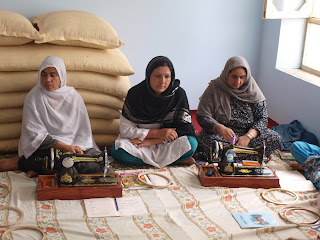All of my province is full of Talibs. Two days ago, two brothers were killed because the Taliban said they worked with the government. One had two children and the other left a pregnant wife. No one can talk, and all men must wear beards. I see the cows can go out, but I am a girl and cannot go out. If I go out, Talibs will kill me, and no one will ask why. Anonymous contributor to the Afghan Women’s Writing Project (www.awwproject.org)
During the past 30 years of conflict in Afghanistan, women and girls have suffered disproportionately. Many have lost fathers, husbands, brothers. Families, households, and livelihoods have been uprooted by the disapora caused by the 1978 Soviet invasion. When civil conflict erupted at the hands of the mujahedeen in 1992, the rights of women were severely restricted. And with the Taliban takeover in 1996, women were marginalized to an extent never before experienced, confined to home except with a mahram/chaperone, denied education, brutalized for showing their faces in public.
Women’s rights are guaranteed in the Constitution of Afghanistan, in Islamic law, and in international treaties acceded to by the Government of Afghanistan, yet there is a enormous breach between policy and practice. In 2010, Afghan women are still forced into marriage to settle disputes between families or tribes, married off as children, denied their rights to education, health care, employment, and inheritance. Afghan women are subject to physical, sexual, and psychological violence as a matter of custom and tradition.
The literacy rate for Afghan women in urban areas is 12.6%, and 10% in rural areas. Nearly 43% of Afghan women are under 18 when they marry. The Shiite Personal Status Law requires women to submit to their husbands’ demands for intercourse, to apply makeup upon command, and to request permission from their husbands and fathers before leaving home. Under this law, husbands are permitted “temporary marriages,” allowing them to seek the company of prostitutes when they are away from home.
In the face of seemingly insurmountable odds, Afghan women have not abandoned hope. Thanks to a rising Afghan civil society movement with many organizations on the ground dedicated to promoting the rights of Afghan women, hope prevails. For each of the risk factors mentioned earlier – forced marriage, widowhood, illiteracy, restricted movement – there is a remedy. When Afghan women become literate and acquire a livelihood skill, the family is strengthened, the household income increases, children are better nourished and sent to school, and women gain the confidence that leads to gender balance in their homes. Domestic violence decreases.
In my work with the Parwan Afghan Women’s Council and my visits to Rabia Balkhi Girls’ High School (Kabul’s most sought-after girls’ school, with an enrollment of 3,000) I have seen the light in the eyes of Afghan women and girls when they are met with the possibility of learning and growing and providing. These women and girls are the agents of change. All they need are the tools -- literacy, livelihood skills and confidence -- to lead their beloved country into the future.



